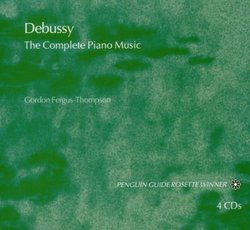| All Artists: Claude Debussy, Gordon Fergus-Thompson Title: Debussy: The Complete Piano Music Members Wishing: 0 Total Copies: 0 Label: Asv Living Era Release Date: 8/24/2004 Album Type: Box set Genres: Dance & Electronic, Special Interest, Classical Styles: Exercise, Ballets & Dances, Waltzes, Chamber Music, Forms & Genres, Ballads, Short Forms, Suites, Historical Periods, Classical (c.1770-1830) Number of Discs: 4 SwapaCD Credits: 4 UPCs: 680125040220, 680125040220 |
Search - Claude Debussy, Gordon Fergus-Thompson :: Debussy: The Complete Piano Music
 | Claude Debussy, Gordon Fergus-Thompson Debussy: The Complete Piano Music Genres: Dance & Electronic, Special Interest, Classical |
Larger Image |
CD Details |
CD ReviewsDebussy with a difference! Scriabinmahler | UK | 03/09/2007 (5 out of 5 stars) " Do not let the dismissive review below make you dismiss this amazing and breath taking complete set. Like his Scriabin recordings, Gordon Fergus-Thompson works wonder with the well known piece like Clair de Lune, Arabesque and Reverie, and breathes new life into the music by his keen sense of tonal colours and delicacy. When it comes to impressionist music, no pianists can match Richter, who played Clair de Lune, Pavane or miroirs like a miracle, but Fergus-Thompson creats his own unique soundscape. He is one of very few pianists alive who pay careful attention to how a note produced on the instrument decays and merges with other notes, while most of pianist nowadays focus mostly on starting point of the sound. That's a secret of the richness of colours and expression in his pianism. He is often criticised for lack of technical prowess, compared to past masters like Gieseking or Michelangeli, but I can not detect even a hint of technical weakness or instability in this set. This is simply a different and highly personal interpretation, and it is a shame to miss out this magical music making simply because it is different from the mainstream interpretation. " Beautifully interpreted kknoll | Wausau, WI | 02/13/2007 (5 out of 5 stars) "Gordon Fergus-Thompson does an amazing job of playing and interpreting Debussy's music. I have been playing piano for years--especially Debussy--and this CD really captures the essence of the music. I'd recommend this to anyone." What a find!! P. Kelley | SC United States | 04/27/2008 (5 out of 5 stars) "I thought I'd never find someone to equal Paul Jacob's recordings of Debussy both for their intensely poetic nature and sheer abundance of technique. Well, now I have. It is actually quite invigorating to hear Fergus-Thompson relax on the myriad arpeggios punctuating Debussy's work--the famous pseudo-arpeggio in thirds which opens Clair de Lune is absolutely other-worldly--while any questions regarding technique ought surely to be put to rest after listening to a few bars of any of the Etudes. Indeed, to bring out the poetic nature of these incredibly complex and difficult works has perhaps never been equalled by anyone else but Jacobs..."
|
